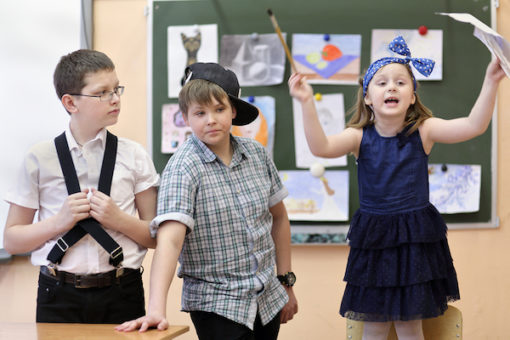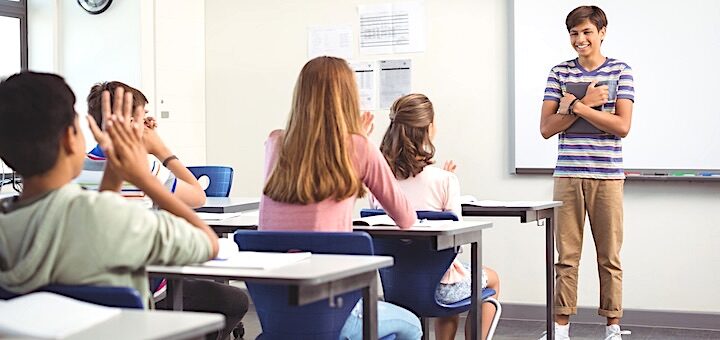Monthly SEL Themes and Activities for Advisory
Frequent MiddleWeb contributor Kasey Short is an English teacher and Director of Middle School Studies at Charlotte (NC) Country Day School.
By Kasey Short
Advisory programs are a common feature of public and independent middle schools across the nation. While advisory comes in many shapes and sizes, we can agree, I think, that Social Emotional Learning (SEL) is an essential component of an advisory program that effectively promotes academic and behavioral growth and development.
At our middle school this year, we set out to help busy teachers better facilitate SEL instruction in their advisories by developing monthly themes and activities.
With the collaboration of our Middle School Director of Counseling, Janani Buford, we designated monthly advisory SEL themes and created lessons that correspond to the needs and interests of middle grades students.
At the beginning of the school year Janani and I presented the yearlong SEL overview to advisors, reviewed the lessons and materials for the August and September lessons, helped advisors develop goals for their advisory, and introduced then to the SEL picture book activities I created to further support SEL instruction in advisory.
Throughout the year we’ll review upcoming themes and activities with advisors during faculty meetings. As situations arise throughout the year, all activities are subject to change and will be modified as needed before presenting to teachers.
The themes were designed with 5th-8th grade students in mind and all activities could be presented in any order and all work as standalones. If you find any of this useful, please feel free to adapt and share.
August/September – Prep for the Year Ahead
The lessons for this month help students set goals and envision a future where they meet their goals, practice organizational techniques, and develop study skills and strategies that will be helpful throughout the year.
Example Activities:
Goal Setting – Students develop four goals for the year that fit into the following categories: Extra Curricular, Academic, Social, and Personal. Students then write or draw/illustrate what it would look like to achieve the goals including how they would feel and the impact it would have on themselves and others.
Study Strategies – Students brainstorm and discuss plans and strategies for effective and efficient study time. Students are given a list of strategies to try and are encouraged to share others that have worked for them in the past with the group. They then implement these strategies for their next major assessment and reflect on how well the strategies worked for them.
October – Self Awareness
This month’s lessons encourage students to consider the cause and effect of their actions, unify advisory groups around a common goal, and use emojis to examine the impact of tone, body language and the differences when speaking in person and digital communication.
Example Activities:
Feelings Skit – Students are placed in small groups and given a list of feelings words. Students then work in their groups to create skits that illustrate the cause and effects of feelings. When designing the skits, groups will consider what actions would cause someone to feel a certain way and what it looks like when someone feels that way. Students then all act out their skits and guess which feelings each group is trying to showcase.
Advisory Motto – Advisory students work together to write a short sentence or phrase that encapsulates the beliefs and ideals that they hope will guide their advisory throughout the year. Then students work together to create a motto poster to display in their classroom. Each student adds their comment to the poster, showcasing one way they will work towards fulfilling the motto during the year.
Book Suggestions
Each Kindness by Jaqueline Woodson
Red: A Crayon’s Story by Michael Hall
November – Gratitude
During November students take time to thank others and reflect on what they are grateful for.
Example Activities:
Thank You Cards – Students spend time writing a thank you card to someone in their life that they would like to thank.
Gratitude ABC’s – Students work in small groups/partners to list things they are grateful for that correspond to each letter of the alphabet and then groups share out with the advisory.
Gratitude Quick Write/Draw – Students take 5 minutes to write and/or sketch as many things that they can think of they are grateful for. Students are encouraged to think of anything from significant people to seemingly insignificant but awesome things that make their lives better.
Book Suggestions
Lend a Hand: Poems about Giving by John Frank
We Are Grateful Otsaliheliga by Traci Sorell
December – Mindfulness
During December students take time to practice various forms of mindfulness and meditation.
Example Activities:
Mindful Coloring – Provide students with a mindful coloring page and coloring utensils and then give them time to color and reflect on how they are feeling as well as on their breath.
Mindful Walk – Take students outside and instruct them to walk silently and while they are walking to focus on their breath and if they find their mind wondering to refocus their attention to their breath and to notice their feet hitting the ground.
Book Suggestions
Mindfulness for Kids in 10 Minutes a Day by Maura Bradley (This book is filled with short activities to practice mindfulness with students.)
My Thoughts Are Clouds: Poems for Mindfulness by Georgia Heard
January – Growth Mindset
Students start the new calendar year creating a growth mindset mantra, celebrate mistakes, and reflect on the end of the first semester and create goals for the second half of the school year.
Example Activities:
Growth Mindset Mantra – Students review a list of growth mindset mantras and chose one or write one of their own to be their growth mindset mantra for the new year. When choosing the mantra, they will think about what they hope for themselves in the new year and how the mantra may help them achieve their goals.
Best Mistake – Students reflect on the best mistake from the year so far by thinking about which mistakes allowed them to learn something or discover something new about themselves.
Book Suggestions
The Magical Yet by Angela DiTerlizzi
The Book of Mistakes by Corinna Luyken
February – Relationship Skills
During February students focus on building new friendships and learning skills to improve their current friendships.
Example Activities:
Mix It Up Lunch – See resources for holding a Mix it Up Lunch from Learning for Justice. We have done these before and had a great success, but it has been a while due to Covid realities and we are looking forward to implementing it again. Students will spend time in advisory before and after their Mix It Up Lunch discussing the difference between friendship circles and cliques.
Compliments – Students will write something kind about each member of their advisory. They will be given guidance for writing these compliments such as be specific, don’t repeat a compliment someone else has already written, and think about everything you know about that person and how those characteristics make our community better and use that knowledge to write a genuine compliment.
March – Decision Making
In March students learn about decision making by improving their digital citizenship skills and learning more about intent vs. impact.
Example Activities:
Digital Decisions – With the help of resources from Common Sense students will discuss the potential impact of their digital footprint and brainstorm what type of digital footprint they hope to have 5 years from now.
Intent vs. Impact – Students will explore various scenarios and examine the intent and impact within those situations and then discuss the questions below:
● What are some factors that contribute to how others interpret your actions?
● What could happen to someone’s feelings when impact is different from the intent?
● How do you feel when you do or say something that was taken differently than you intended?
● How do you feel when you have been hurt and find out the person didn’t mean to hurt you?
● What can you do to help make sure your impact matches your intent?
April – Social Awareness
During April students focus on social awareness by practicing community service and spending time learning about and celebrating Earth Day.
May – Celebrate Success
As we finish up the school year, it is a perfect time to celebrate individual and advisory successes.
Kasey Short (@shortisweet3) loves to share ideas from her classroom and writes frequently for MiddleWeb. She attended the University of North Carolina at Chapel Hill and earned a bachelor of arts in middle school education with a concentration in English and history. She went on to earn a master’s in curriculum and instruction from Winthrop University. Kasey is the Middle School Director of Studies and an 8th Grade English Teacher and Advisor at Charlotte (NC) Country Day School.



































